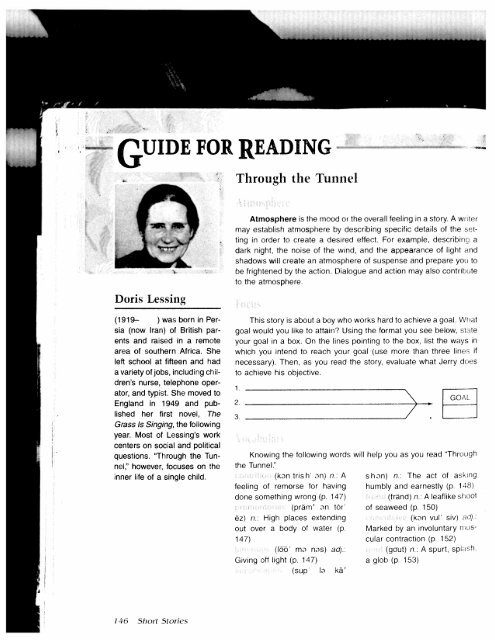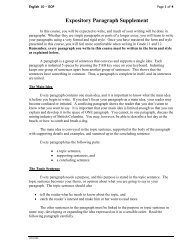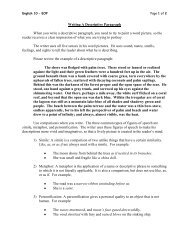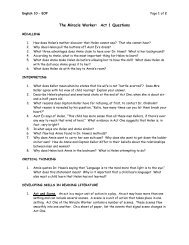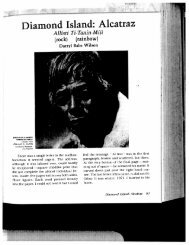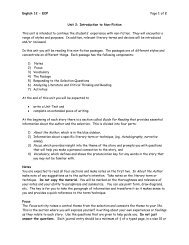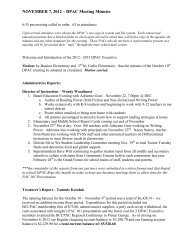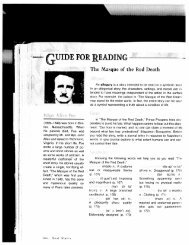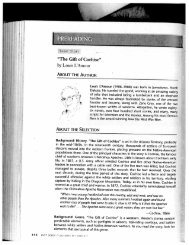Unit 1 Lesson 4 - Through the Tunnel.pdf
Unit 1 Lesson 4 - Through the Tunnel.pdf
Unit 1 Lesson 4 - Through the Tunnel.pdf
Create successful ePaper yourself
Turn your PDF publications into a flip-book with our unique Google optimized e-Paper software.
GUIDE FOR READING<br />
Th<br />
a.Ii fli, TaI<br />
.L 11L.L4..<br />
.L LII1II..I<br />
Doris Lessing<br />
(1919— ) was born in Per<br />
sia (now Iran) of British par<br />
ents and raised in a remote<br />
area of sou<strong>the</strong>rn Africa. She<br />
left school at fifteen and had<br />
a variety of jobs, including chil<br />
dren’s nurse, telephone oper<br />
ator, and typist. She moved to<br />
England in 1949 and pub<br />
lished her first novel, The<br />
Grass Is Singing, <strong>the</strong> following<br />
year. Most of Lessing’s work<br />
centers on social and political<br />
questions. “<strong>Through</strong> <strong>the</strong> Tun<br />
nel,” however, focuses on <strong>the</strong><br />
inner life of a single child.<br />
Atmosphere is <strong>the</strong> mood or <strong>the</strong> overall feeling in a story. A v.<br />
may establish atmosphere by describing specific details of <strong>the</strong><br />
ting in order to create a desired effect. For example, describi a<br />
dark night, <strong>the</strong> noise of <strong>the</strong> wind, and tire appearance of light . .d<br />
shadows will create an atmosphere of suspense and prepare yc :o<br />
be frightened by <strong>the</strong> action. Dialogue and action may also contrI e<br />
to <strong>the</strong> atmosphere.<br />
This story is about a boy who works hard to achieve a goal.<br />
goal would you like to attain? Using <strong>the</strong> format you see below<br />
your goal in a box. On <strong>the</strong> lines pointing to <strong>the</strong> box, list <strong>the</strong> wa,<br />
which you intend to reach your goal (use more than three hr.<br />
necessary). Then, as you read <strong>the</strong> story. evaluate what Jerry c<br />
to achieve his objective.<br />
Knowing <strong>the</strong> following words will help you as you read ‘Thr<br />
<strong>the</strong> <strong>Tunnel</strong>,”<br />
(kn trish n) n.. A shrn) n: The act of a..<br />
feeling of remorse for having humbly and earnestly (p<br />
done something wrong (p. 147)<br />
(pram’ n tOr<br />
(frànd) n.: A leaflike<br />
of seaweed (p. 150)<br />
ez) n. High places extending<br />
(kn vul siv)<br />
out over a body of water (p Marked by an involuntary..<br />
147)<br />
cular contraction (p. 152)<br />
(loO m ns) adj.<br />
(gout) n: A spurt. s. .“<br />
Giving ott light (p. 147)<br />
a glob (p 153)<br />
isup b ka’<br />
146 Slio,i Stories
<strong>Through</strong> <strong>the</strong> <strong>Tunnel</strong><br />
Doris Lessing<br />
Going to <strong>the</strong> shore on <strong>the</strong> first morning<br />
of <strong>the</strong> vacation, <strong>the</strong> young English boy<br />
stopped at a turning of <strong>the</strong> path and looked<br />
down at a wild and rocky bay, and <strong>the</strong>n over<br />
to <strong>the</strong> crowded beach he knew so well from<br />
o<strong>the</strong>r years. His mo<strong>the</strong>r walked on in front<br />
of him, carrying a bright striped bag in one<br />
hand Her o<strong>the</strong>r arm, swinging loose, was<br />
very white In <strong>the</strong> sun. The boy watched that<br />
white, naked arm, and turned his eyes,<br />
which had a frown behind <strong>the</strong>m, toward <strong>the</strong><br />
bay and back again to his mo<strong>the</strong>r. When she<br />
felt he was not with her, she swung around.<br />
“Oh, <strong>the</strong>re you are, Jerry!” she said. She<br />
looked Impatient, <strong>the</strong>n smiled. “Why, dar<br />
ling, would you ra<strong>the</strong>r not come with me?<br />
Would you ra<strong>the</strong>r—” She frowned, consci<br />
entiously worrying over what amusements<br />
he might secretly be longing for, which she<br />
had been too busy or too careless to imagine.<br />
He was very familiar with that anxious,<br />
apologetic smile. Contrition sent him run<br />
ning after her. And yet, as he ran, he looked<br />
back over his shoulder at <strong>the</strong> wild bay; and<br />
all morning, as he played on <strong>the</strong> safe beach,<br />
he was thinking of it.<br />
Next morning, when It was time for <strong>the</strong><br />
routine of swimming and sunbathing, his<br />
mo<strong>the</strong>r said, “Are you tired of <strong>the</strong> usual<br />
beach, Jerry? Would you like to go some<br />
where else?”<br />
‘Oh, no!” he said quickly, smiling at her<br />
out of that unfailing impulse of contrition<br />
—a ‘rt of chivalry. Yet, walking down <strong>the</strong><br />
path with her, he blurted out, “I’d like to go<br />
and have a look at those rocks down <strong>the</strong>re.”<br />
She gave <strong>the</strong> idea her attention. It was a<br />
wild-looking place, and <strong>the</strong>re was no one<br />
<strong>the</strong>re; but she said, “Of course, Jerry. When<br />
you’ve had enough, come to <strong>the</strong> big beach.<br />
Or just go straight back to <strong>the</strong> villa, if you<br />
like.” She walked away, that bare arm, now<br />
slightly reddened from yesterday’s sun,<br />
swinging. And he almost ran after her<br />
again, feeling it unbearable that she should<br />
go by herself, but he did not.<br />
She was thinking, Of course he’s old<br />
enough to be safe without me. Have I been<br />
keeping him too close? He mustn’t feel he<br />
ought to be with me. I must be careful.<br />
He was an only child, eleven years old.<br />
She was a widow. She was determined to be<br />
nei<strong>the</strong>r possessive nor lacking in devotion.<br />
She went worrying off to her beach.<br />
As for Jerry, once he saw that his moth<br />
er had gained her beach, he began <strong>the</strong> steep<br />
descent to <strong>the</strong> bay. From where he was, high<br />
up among red-brown rocks, it was a scoop of<br />
moving bluish green fringed with white. As<br />
he went lower, he saw that it spread among<br />
small promontorles and inlets of rough,<br />
sharp rock, and <strong>the</strong> crisping, lapping sur<br />
face showed stains of purple and darker<br />
blue. Finally, as he ran sliding and scraping<br />
down <strong>the</strong> last few yards, he saw an edge of<br />
white surf and <strong>the</strong> shallow, luminous move<br />
ment of water over white sand, and, beyond<br />
that, a solid, heavy blue.<br />
<strong>Through</strong> <strong>the</strong> <strong>Tunnel</strong> 147
148 Short Stories<br />
went out fast over <strong>the</strong> gleaming sand, over a<br />
Irregular cold currents from <strong>the</strong> deep water<br />
<strong>the</strong> promontory that was between It and <strong>the</strong><br />
monsters under <strong>the</strong> surface, and <strong>the</strong>n he<br />
and looked for his mo<strong>the</strong>r. There she was, a<br />
<strong>the</strong> rocks. The English boy swam toward<br />
look back not only on <strong>the</strong> little bay but past<br />
middle region where rocks lay like discolored<br />
swimming. He was a good swimmer. He<br />
was in <strong>the</strong> real sea—a warm sea where<br />
shocked his limbs.<br />
When he was so far out that he could<br />
speck of yellow under an umbrella that<br />
back to shore, relieved at being sure she was<br />
tory was a loose scatter of rocks, Above<br />
clo<strong>the</strong>s. They came running, naked, down to<br />
<strong>the</strong>re, but all at once very lonely.<br />
<strong>the</strong>m, some boys were stripping off <strong>the</strong>ir<br />
<strong>the</strong> side of <strong>the</strong> bay away from <strong>the</strong> promon<br />
big beach, he floated on <strong>the</strong> buoyant surface<br />
looked like a slice of orange peel. He swam<br />
On <strong>the</strong> edge of a small cape that marked<br />
He ran straight into <strong>the</strong> water and began<br />
Suzanne Nagler f’hotograph © Stephen Tucker<br />
THE $EACH TREAT (detail)<br />
Collection of Mr. and Mrs. X. Daniel lcafcas<br />
$<br />
throw. They were of that coast; all of <strong>the</strong>m<br />
with <strong>the</strong>m, of <strong>the</strong>m, was a craving that filled<br />
with a desperate, nervous supplication.<br />
was a foreigner strayed from his own beach,<br />
a high point into a well of blue sea between<br />
It was enough. In a minute, he had swum in<br />
turned and watched him with narrowed.<br />
alert dark eyes. Then one smiled and waved.<br />
ing a language he did not understand. To b<br />
again. They were big boys—men. to Jerry.<br />
They shouted cheerful greetings at him: and<br />
was happy. He was with <strong>the</strong>m.<br />
They began diving again and again from<br />
were burned smooth dark brown and speak<br />
<strong>the</strong>m, but kept his distance at a stone’f<br />
his whole body. He swam a little closer; <strong>the</strong>y<br />
and <strong>the</strong>y proceeded to forget him. But he<br />
<strong>the</strong>mselves up, and waited <strong>the</strong>ir turn to dive<br />
rough, pointed rocks. After <strong>the</strong>y had dived<br />
and was on <strong>the</strong> rocks beside <strong>the</strong>m, smiling<br />
<strong>the</strong>n, as he preserved his nervous, uncom<br />
prehending smile, <strong>the</strong>y understood that he<br />
and come up, <strong>the</strong>y swam around, hauled<br />
I<br />
4—’.,
He dived, and <strong>the</strong>y watched him; and when<br />
swam around to take his place, <strong>the</strong>y<br />
made ‘,ay for him. He felt he was accepted<br />
and he divt’c again. carefully, proud of himself.<br />
soon <strong>the</strong> biggest of <strong>the</strong> boys poised him<br />
self. shot down into <strong>the</strong> water, and did not<br />
come up. The o<strong>the</strong>rs stood about, watching.<br />
JerrV after waiting for <strong>the</strong> sleek brown head<br />
to apper let out a yell of warning; <strong>the</strong>y<br />
looked it him idly and turned <strong>the</strong>ir eyes<br />
back toward <strong>the</strong> water. After a long time, <strong>the</strong><br />
boy came up on <strong>the</strong> o<strong>the</strong>r side of a big dark<br />
rock, letting <strong>the</strong> air out of his lungs in a<br />
sputter rig gasp and a shout of triumph.<br />
Jrnediatdly <strong>the</strong> rest of <strong>the</strong>m dived in. One<br />
moment, <strong>the</strong> morning seemed full of chat<br />
tering boys; <strong>the</strong> next, <strong>the</strong> air and <strong>the</strong> surface<br />
of <strong>the</strong> water were empty. But through <strong>the</strong><br />
heavy blue, dark shapes could be seen mov<br />
ing and groping.<br />
Jerry dived, shot past <strong>the</strong> school of un<br />
derwater swimmers, saw a black wall of<br />
rock looming at him, touched it, and bobbed<br />
up at once to <strong>the</strong> surface, where <strong>the</strong> wall was<br />
a low barrier he could see across. There was<br />
no one visible; under him, In <strong>the</strong> water, <strong>the</strong><br />
dim shapes of <strong>the</strong> swimmers had disap<br />
peared. Then one, and <strong>the</strong>n ano<strong>the</strong>r of <strong>the</strong><br />
boys came up on <strong>the</strong> far side of <strong>the</strong> barrier of<br />
rock, and he understood that <strong>the</strong>y had<br />
swum through some gap or hole in it. He<br />
plunged down again. He could see nothing<br />
through <strong>the</strong> stinging salt water but <strong>the</strong><br />
blank rock. When he came up <strong>the</strong> boys were<br />
all on<strong>the</strong> diving rock, preparing to attempt<br />
<strong>the</strong> feat again. And now, in a panic of fail<br />
ure, he yelled up, in English, “Look at me!<br />
Look!” and he began splashing and kicking<br />
in <strong>the</strong> water like a foolish dog.<br />
They looked down gravely, frowning. He<br />
knew <strong>the</strong> frown. At moments of failure,<br />
when he downed to claim his mo<strong>the</strong>r’s at<br />
tention, a was with just this grave, embar<br />
rassed inspection that she rewarded him.<br />
e<br />
<strong>Through</strong> his hot shame, feeling <strong>the</strong> pleading<br />
grin on his face like a scar that he could<br />
never remove, he looked up at <strong>the</strong> group of<br />
big brown boys on <strong>the</strong> rock and shouted,<br />
‘Bortjour! Merci! Au revoir! Monsieur, mon<br />
sieur!” while he hooked his fingers round<br />
his ears and waggled <strong>the</strong>m.<br />
Water surged into his mouth; he<br />
choked, sank, came up. The rock, lately<br />
weighted with boys, seemed to rear up out of<br />
<strong>the</strong> water as <strong>the</strong>ir weight was removed. They<br />
were flying down past him, now, into <strong>the</strong><br />
water; <strong>the</strong> air was full of falling bodies. Then<br />
<strong>the</strong> rock was empty in <strong>the</strong> hot sunlight. He<br />
counted one, two, three.<br />
At fifty. he was terrified. They must all<br />
be drowning beneath him, in <strong>the</strong> watery<br />
caves of <strong>the</strong> rock! At a hundred, he stared<br />
around him at <strong>the</strong> empty hillside, wondering<br />
if he should yell for help. He counted faster.<br />
faster, to hurry <strong>the</strong>m up. to bring <strong>the</strong>m to<br />
<strong>the</strong> surface quickly. to drown <strong>the</strong>m quickly<br />
—anything ra<strong>the</strong>r than <strong>the</strong> terror of count<br />
ing on and on into <strong>the</strong> blue emptiness of <strong>the</strong><br />
morning. And <strong>the</strong>n, at a hundred and sixty,<br />
<strong>the</strong> water beyond <strong>the</strong> rock was full of boys<br />
blowing like brown whales. They swam<br />
back to <strong>the</strong> shore without a look at him.<br />
He climbed back to <strong>the</strong> diving rock and<br />
sat down, feeling <strong>the</strong> hot roughness of It<br />
under his thighs. The boys were ga<strong>the</strong>ring<br />
up <strong>the</strong>ir bits of clothing and running off<br />
along <strong>the</strong> shore to ano<strong>the</strong>r promontory.<br />
They were leaving to get away from him. He<br />
cried openly, fists in his eyes. There was no<br />
one to see him, and he cried himself out.<br />
It seemed to him that a long time had<br />
passed, and he swam out to where he could<br />
see his mo<strong>the</strong>r. Yes, she was still <strong>the</strong>re, a<br />
yellow spot under an orange umbrella. He<br />
swam back to <strong>the</strong> big rock, climbed up, and<br />
1<br />
1. BonJour! . . . monsieur (hOn zhmr’.,. ma syO):<br />
Babbling of commonly known French words: “Hello!<br />
Thank you! Goodbye! Sir. sir!”<br />
<strong>Through</strong> <strong>the</strong> <strong>Tunnel</strong> 149
150 Short Stories<br />
as she said casually, “Well, of course, dar<br />
<strong>the</strong> water sparkled as if sequins were drop-<br />
bay.<br />
fixed <strong>the</strong> goggles tight and firm, filled his<br />
like a water dance. A few inches above <strong>the</strong>m<br />
some swimming goggles,” he panted, defi<br />
rippled firm and hard by <strong>the</strong> tides. Two<br />
swerve off, and come around again. It was<br />
poise motionless, make a dart forward.<br />
She gave him a patient, inquisitive look<br />
was off, running down <strong>the</strong> steep path to <strong>the</strong><br />
Under him, six or seven feet down, was a<br />
rounded pieces of wood or slate. They were<br />
gles, he grabbed <strong>the</strong>m from her hand as If<br />
this minute, and no o<strong>the</strong>r time. He nagged<br />
But now, now, now! He must have <strong>the</strong>m<br />
ling.”<br />
shop. As soon as she had bought <strong>the</strong> gog<br />
she were going to claim <strong>the</strong>m for herself, and<br />
grayish shapes steered <strong>the</strong>re, like long.<br />
a different kind—fish eyes that showed<br />
floor of perfectly clean, shining white sand,<br />
Now he could see. It was as if he had eyes of<br />
uum, and <strong>the</strong> goggles came loose. He under<br />
lungs, and floated, face down, on <strong>the</strong> water.<br />
<strong>the</strong> rock from <strong>the</strong> surface of <strong>the</strong> water. He<br />
stood that he must swim down to <strong>the</strong> base of<br />
of <strong>the</strong> water broke <strong>the</strong> rubber-enclosed vac<br />
Jerry swam out to <strong>the</strong> big barrier rock,<br />
ant and beseeching.<br />
path, swinging her striped bag, <strong>the</strong> flushed,<br />
and pestered until she went with him to a<br />
He came to <strong>the</strong> surface, swam to shore<br />
not see.<br />
and went back to <strong>the</strong> villa to wait for his<br />
mo<strong>the</strong>r. Soon she walked slowly up <strong>the</strong><br />
adjusted <strong>the</strong> goggles, and dived. The impact<br />
everything clear and delicate and wavering<br />
he touched <strong>the</strong> wall of rock again. But <strong>the</strong><br />
and angry boulders. Down he went, until<br />
salt was so painful in his eyes that he could<br />
naked arm dangling beside her. “I want<br />
dived into <strong>the</strong> blue pool among <strong>the</strong> fanged<br />
in <strong>the</strong> bright water.<br />
fish. He saw <strong>the</strong>m nose toward each o<strong>the</strong>r,<br />
lay on <strong>the</strong> diving rock. He looked down into<br />
again he groped over <strong>the</strong> surface of <strong>the</strong> roe i.<br />
jammed, moved <strong>the</strong>m In sidewise. and wa<br />
reached <strong>the</strong> sunlight, swam to shore, and<br />
mouth of <strong>the</strong> tunnel. But It was enough. He<br />
sheer out of <strong>the</strong> white sand—black, tuft 1<br />
<strong>the</strong> hole, and tried to push himself In.<br />
harmless tentacle of seaweed drifting in <strong>the</strong><br />
arms, let himself down over <strong>the</strong> side of tht<br />
anchor, clung with his hands to <strong>the</strong> edges o<br />
nothing ahead. Something soft and clamm<br />
and caught a glimpse, as he retreated, of a<br />
Again and again he rose, took a<br />
gap in it. He swam down to Its base.<br />
feeling It, almost hugging It in <strong>the</strong> despera<br />
lightly with greenish weed. He could see i<br />
while he was clinging to <strong>the</strong> black wall, h:s<br />
found <strong>the</strong> hole.<br />
rock. He dropped, with <strong>the</strong> weight, straigh<br />
filled him. He thought of octopuses, of clinging<br />
weed. He pushed himself out backward<br />
he found a big one, and, with this in hi<br />
He gained <strong>the</strong> surface, clambered abot<br />
He got his head in, found his shoulders<br />
could not see deep into it. He let go of hir<br />
hole. It was an irregular, dark gap; but h<br />
looked in under <strong>the</strong> dark shelf at <strong>the</strong> placf<br />
anchor of stone, he lay on his side an<br />
like swimming in flaked silver. The gre. t<br />
moment he could feel <strong>the</strong> innumerable tii v<br />
where his feet had gone. He could see tht<br />
were drifting through <strong>the</strong> water, and ir d<br />
to <strong>the</strong> sandy floor. Clinging tight to th<br />
moving against <strong>the</strong> grayish rock, and pani<br />
inside as far as his waist. He could set<br />
touched his mouth; he saw a dark frond<br />
minute fish, <strong>the</strong> length of his fingern 1,<br />
touches of <strong>the</strong>m against his limbs. It . s<br />
chestful of air, and went down. Again and<br />
knees came up and he shot his feet o;;d<br />
<strong>the</strong> stones that littered <strong>the</strong> barrier rock unti<br />
ping through It. Fish again—myilads f<br />
rock <strong>the</strong> big boys had swum through ro<br />
need to find <strong>the</strong> entrance. And <strong>the</strong>n, onct<br />
forward and <strong>the</strong>y met no obstacle. He h;
• :roiigh that cave, or hole, or fun<br />
<strong>the</strong><br />
di of water. He knew he must find<br />
let go t <strong>the</strong> rock and went up into <strong>the</strong> air. He<br />
one.<br />
11[V10 His chest was hurting. He<br />
He sat by <strong>the</strong> clock in <strong>the</strong> villa, when his<br />
felt its sharpness about his shoulders.<br />
was possible to see. it was as if he already<br />
knew every jut and corner of it, as far as it<br />
and studied <strong>the</strong> entrance to <strong>the</strong> tunnel. He<br />
Fir t. lie thought, he must learn to con<br />
going to try yet. A curious, most unchildlike<br />
him wait. In <strong>the</strong> meantime, he lay underwa<br />
he had brought down from <strong>the</strong> upper air,<br />
ter on <strong>the</strong> white sand, littered now by stones<br />
persistence, a controlled impatience, made<br />
villa and found his mo<strong>the</strong>r at her supper.<br />
She said only ‘Did you enjoy yourself’?” and<br />
aw that <strong>the</strong> sun was low. He rushed to <strong>the</strong><br />
he said Yes.”<br />
nel. 1J ,ut <strong>the</strong> o<strong>the</strong>r side.<br />
All arht <strong>the</strong> boy dreamed of <strong>the</strong> waterfilled<br />
ca’.e in <strong>the</strong> rock, and as soon as break<br />
fast w IS over he went to <strong>the</strong> bay.<br />
arms, o that he could lie effortlessly on <strong>the</strong><br />
<strong>the</strong> w tr’r with ano<strong>the</strong>r big stone In his<br />
trol hi hrthing. He let himself down into<br />
hours !i had been underwater, learning to<br />
hold hi breath, and now he felt weak and<br />
dizzy. His mo<strong>the</strong>r said, “I shouldn’t overdo<br />
things darting, if I were you.”<br />
three ounted steadily. He could hear<br />
bottom a <strong>the</strong> sea. He counted. One, two,<br />
<strong>the</strong> m ,verrient of blood in his chest. Fifty<br />
mo<strong>the</strong>r insisted on his coming with her <strong>the</strong><br />
his lungs as if everything, <strong>the</strong> whole of his<br />
day of his .arefu1 self-training, but he stayed<br />
next day. It was a torment to him to waste a<br />
life, all that he would become, depended<br />
with her on that o<strong>the</strong>r beach, which now<br />
upon it. a.ain his nose bled at night, and his<br />
seemed r place for small children, a place<br />
where h:s mo<strong>the</strong>r might lie safe in <strong>the</strong> sun.<br />
It was not his beach.<br />
before his mo<strong>the</strong>r could consider <strong>the</strong> compli<br />
following day, to go to his beach. He went,<br />
cated rithts and wrongs of <strong>the</strong> matter. A<br />
count by ten. The big boys had made <strong>the</strong><br />
day’s rast, he discovered, had Improved his<br />
Sixty. He had been counting fast, in his<br />
passage vhile he counted a hundred and<br />
through that long tunnel, but he was not<br />
fright. Pr hably now, if he tried, he could get<br />
That night, his nose bled badly. For<br />
That day and <strong>the</strong> next, Jerry exercised<br />
He iid riot ask for permission, on <strong>the</strong><br />
defiantly to himself. But two days before<br />
<strong>the</strong>y were to leave—a day of triumph when<br />
authorized by <strong>the</strong> clock, brought close <strong>the</strong><br />
he could hold his breath without strain for<br />
two minutes. The words ‘Iwo minutes,”<br />
adventure that was so necessary to him.<br />
casually one morning, <strong>the</strong>y must go home.<br />
On <strong>the</strong> day before <strong>the</strong>y left, he would do it.<br />
he increased his count by fifteen—his nose<br />
He would do It if it killed him, he said<br />
lie limply over <strong>the</strong> big rock like a bit of<br />
would. He was trembling with fear that he<br />
would not go; and he was trembling with<br />
onto <strong>the</strong> rock and trickle slowly down to <strong>the</strong><br />
bled so badly that he turned dizzy and had to<br />
seaweed, watching <strong>the</strong> thick red blood flow<br />
died <strong>the</strong>re, trapped? Supposing—his head<br />
gave up. He thought he would return to <strong>the</strong><br />
turned dizzy in <strong>the</strong> tunnel? Supposing he<br />
sea. He was frightened. Supposing he<br />
went around, in <strong>the</strong> hot sun, and he almost<br />
house and lie down, and next summer, per<br />
or thought he had, he found himself sitting<br />
haps, when he had ano<strong>the</strong>r year’s growth in<br />
water; and he knew that now, this moment,<br />
up on <strong>the</strong> rock and looking down into <strong>the</strong><br />
him—<strong>the</strong>n he would go through <strong>the</strong> hole.<br />
He was incredulous and <strong>the</strong>n proud to find<br />
mo<strong>the</strong>r was not near, and checked his time.<br />
when his nose had only just stopped bleed<br />
throbbing—this was <strong>the</strong> moment when he<br />
ing, when his head was still sore and<br />
would try. If he did not do It now, he never<br />
In ano<strong>the</strong>r four days, his mo<strong>the</strong>r said<br />
But even after he had made <strong>the</strong> decision,<br />
<strong>Through</strong> <strong>the</strong> <strong>Tunnel</strong> 151
He<br />
152 Short Stories<br />
year—those big boys would swim into it and<br />
carry and slipped over <strong>the</strong> edge of <strong>the</strong> rock<br />
He put on his goggles, fitted <strong>the</strong>m tight,<br />
lie until one day—perhaps not before next<br />
where he would go. If he died <strong>the</strong>re, he would<br />
rock, under <strong>the</strong> sea. Even In <strong>the</strong> open sun<br />
light, <strong>the</strong> barrier rock seemed very wide and<br />
very heavy: tons of rock pressed down on<br />
once at <strong>the</strong> empty sky, filled his lungs once,<br />
find It blocked.<br />
twice, and <strong>the</strong>n sank fast to <strong>the</strong> bottom with<br />
took <strong>the</strong> edges of <strong>the</strong> hole in his hands and<br />
Soon he was clear inside. He was in a<br />
legs as levers. His head knocked against<br />
.<br />
fifty-one, fifty-two...<br />
light, and <strong>the</strong> water seemed to press upon<br />
hole must have widened out. He thought he<br />
against <strong>the</strong> roof. The roof was sharp and<br />
as sharp. Again he thought of octopuses,<br />
hands moved freely, as if in open water. The<br />
He was being continually pressed against<br />
seventy-two. . . . There<br />
kicking himself along with his feet.<br />
drew himself Into It, wriggling his shoulders<br />
in sidewise as he remembered he must,<br />
small rockbound hole filled with yellowishgray<br />
water. The water was pushing him up<br />
him with <strong>the</strong> weight of rock. Seventy-one,<br />
was without<br />
horror at that long, long tunnel under <strong>the</strong><br />
tested <strong>the</strong> vacuum. His hands were shaking.<br />
Then he chose <strong>the</strong> biggest stone he could<br />
until half of him was in <strong>the</strong> cool, enclosing<br />
water and half in <strong>the</strong> hot sun. He looked up<br />
with his hands—fast, fast—and used his<br />
something; a sharp pain dizzied him. Fifty,<br />
lungs. He felt like an inflated balloon, his<br />
was pulsing.<br />
ducked his head, and swam. His feet and<br />
<strong>the</strong> stone. He let it go and began to count. He<br />
pained his back. He pulled himself along<br />
<strong>the</strong> sharp roof, which felt slimy as well<br />
was no strain on his<br />
lungs were so light and easy. but his head<br />
and wondered if <strong>the</strong> tunnel might be filled<br />
with weed that could tangle him. He gave<br />
himself a panicky, convulsive kick forward,<br />
were beginning to hurt. A few more strok<br />
a long time later, a hundred and fifteer.<br />
fifteen, he heard himself say inside his head<br />
light was falling through it, showing th’<br />
drown. His head was swelling, his lungs<br />
he feebly clutched at rocks In <strong>the</strong> dark<br />
ing pain filled his head, and <strong>the</strong>n <strong>the</strong> dark<br />
him out into <strong>the</strong> open sea.<br />
A hundred, a hundred and one.. .<br />
ly; he said a hundred and fifteen, and <strong>the</strong>n.<br />
Tll<br />
rowed.<br />
dying. He was no longer quite conscious. He<br />
light. His hands, groping forward, met noth<br />
up to <strong>the</strong> air. He was gasping like a fish. He<br />
see nothing but a red-veined, clotted dark.<br />
were full of blood. He tore off his goggles and<br />
on Into <strong>the</strong> blackness ahead, or he would<br />
felt he would sink now and drown; he could<br />
ing: and his feet, kicking back, propelled<br />
His eyes must have burst, he thought: <strong>the</strong>y<br />
on to it. He lay face down, gasping. He could<br />
he was clutching it and pulling himself up<br />
—but he had said that long ago. He must gn<br />
He looked up at <strong>the</strong> crack as if it were filled<br />
He was at <strong>the</strong> end of what he could do<br />
He drifted to <strong>the</strong> surface, his face turned<br />
ened of banging his head if <strong>the</strong> tunnel nai<br />
again. The water was a clear jewel-green all<br />
clean, dark rock of <strong>the</strong> tunnel, a singl.<br />
cracking. A hundred and fifteen, a hundred<br />
water paled. Victory filled him. His lungs<br />
must be swimming fast, and he was fright<br />
around him. Then he saw, above his head, a<br />
crack running up through <strong>the</strong> rock. Sun<br />
mussel shell, and darkness ahead.<br />
with air and not water, as if he could put hic<br />
and fifteen pounded through his head, ano<br />
mouth to It to draw In air. A hundred and<br />
pulling himself forward, leaving <strong>the</strong> brief<br />
space of sunlit water behind. He felt he was<br />
struggled on in <strong>the</strong> darkness between lapses<br />
into unconsciousness. An immense, swell<br />
not swim <strong>the</strong> few feet back to <strong>the</strong> rock. Then<br />
and he would be out. He was counting wik<br />
ness cracked with an explosion of green
down.<br />
.4..<br />
., ‘ ‘ .‘.‘ .. ..<br />
a gout of blood went into <strong>the</strong> sea. His nose<br />
goggles.<br />
was bleeding. and <strong>the</strong> blood had filled <strong>the</strong><br />
did not know whe<strong>the</strong>r it was blood or salt<br />
<strong>the</strong> cocA, salty sea, to splash on his face, and<br />
water he tasted. After a time, his heart<br />
quieted, his eyes cleared, and he sat up. He<br />
could see <strong>the</strong> local boys diving and playing<br />
half a mile away. He did not want <strong>the</strong>m. He<br />
wanted nothing but to get back home and lie<br />
she wailced into <strong>the</strong> villa, smiling, her eyes<br />
lighting op.<br />
and climbed slowly up <strong>the</strong> path to <strong>the</strong> villa.<br />
He flung himself on his bed and slept, wak<br />
ing at <strong>the</strong> sound of feet on <strong>the</strong> path outside.<br />
<strong>the</strong> bathroom, thinking she must not see his<br />
face with bloodstains, or tearstains, on it.<br />
His mo<strong>the</strong>r was coming back. He rushed to<br />
He came out of <strong>the</strong> bathroom and met her as<br />
He scooped up handfuls of water from<br />
In a short while, Jerry swam to shore<br />
‘. :.<br />
ing her hand on his warm brown shoulder a<br />
moment.<br />
was worried. And <strong>the</strong>n she said to herself,<br />
strained; his eyes were glazed-looking. She<br />
Oh, don’t fuss! Nothing can happen. He can<br />
and anxious, “How did you bang your head?”<br />
swim like a fish.<br />
water for two minutes—three minutes, at<br />
least.” It came bursting out of him.<br />
to swim any more today.”<br />
shouldn’t overdo it. I don’t think you ought<br />
gave in at once. It was no longer of <strong>the</strong> least<br />
importance to go to <strong>the</strong> bay.<br />
They sat down to lunch toge<strong>the</strong>r.<br />
“Mummy,” he said, “I can stay under<br />
She looked at him closely. He was<br />
“Have a nice morning?” she asked, lay<br />
“Oh. yes, thank you,” he said.<br />
“You look a bit pale.” And <strong>the</strong>n, sharp<br />
“Oh, just banged it,” he told her.<br />
She was ready for a battle of wills, but he<br />
“Can you, darling?” she said. “Well, I<br />
COAST SCEItE. ISLES OP SHOAlS. 1901<br />
The Metropolitan Museum of Art<br />
<strong>Through</strong> <strong>the</strong> <strong>Tunnel</strong> 153<br />
Chflde liassam
I<br />
A<br />
154 Shot /<br />
events and <strong>the</strong> outcome In <strong>Through</strong> <strong>the</strong> <strong>Tunnel</strong>”<br />
in a story sets up your expectations about <strong>the</strong><br />
ing a storys mood The atmosphere developed<br />
dialogue and action may also play a role in defin<br />
setting often help establish <strong>the</strong> atmosphere. hut<br />
by a ctory or a scene Descriptions of a story’s<br />
Atmosphere is <strong>the</strong> prevalent feeling created<br />
/r, JJ Ii i Id<br />
some examples.<br />
in which <strong>the</strong>y challenge <strong>the</strong>mselves? Give<br />
10. Why do many young people set up situations<br />
<strong>the</strong> least importance”?<br />
story? Why is going to <strong>the</strong> bay “no longer of<br />
to <strong>the</strong> title. Explain both<br />
8 There are both literal and figurative aspects<br />
conflicts as he swims through <strong>the</strong> tunnel. Ex<br />
7. Jerry experiences both external and internal<br />
ming through <strong>the</strong> tunnel<br />
plain both his conflicts.<br />
7<br />
your opinions.<br />
change by <strong>the</strong> end of <strong>the</strong> story? Cite specific<br />
instances in <strong>the</strong> story that helped you form<br />
at <strong>the</strong> beginning of <strong>the</strong> story How does it<br />
5. Describe Jerrys relationship with his mo<strong>the</strong>r<br />
6. What must Jerry prove to himself by swim<br />
9 How has Jerry changed in <strong>the</strong> course of this<br />
4 How does Jerry prepare for his task?<br />
boys What effect does it have on him<br />
2<br />
3. Describe Jerry’s encounter with <strong>the</strong> local<br />
and risks entailed? Why or why not?<br />
2 Do you think Jerry’s victory is worth <strong>the</strong> pain<br />
dont you admire? Explain your answers<br />
1 What qualities do you admire in terry? Which<br />
‘r’)\I1\ TO ill Si 11(1 lO\<br />
148 and 153 in this story. For each piece of a’<br />
or <strong>the</strong> underwater tunnel. You may add any dr<br />
or four people, exchange ideas about what typE<br />
play it for <strong>the</strong> class<br />
whe<strong>the</strong>r you think <strong>the</strong>se pieces appropriately car<br />
descriptions of <strong>the</strong> atmospheres in <strong>the</strong> paintino<br />
has made its selection, bring in <strong>the</strong> music no’<br />
tails that appeal to more than one sense in yor<br />
what music would you use? In a group of thrcr<br />
music before choosing one When your group<br />
story. You may wish to show <strong>the</strong> bay. <strong>the</strong> rock<br />
or you might need to listen to several pieces c<br />
group might have specific suggestions in mino<br />
of music would best accornoany <strong>the</strong> story. Yot<br />
why. When you revise your work. add sensory d<br />
mo<strong>the</strong>r’s world. It you think <strong>the</strong>y do not, expIa<br />
ture <strong>the</strong> atmospheres of Jerry’s world and h<br />
Then write a few paragraphs in which you discu<br />
I!<br />
describe <strong>the</strong> setting of this story. Using h<br />
produce this story on television or in a mov<br />
2 Cross-curricular Connection. If you were<br />
ements described by <strong>the</strong> author<br />
tails that you wish. but be sure to include <strong>the</strong> e<br />
1. Art. Doris Lessing uses vivid word pictures<br />
AJ\I\(, OI I<br />
words as a guide, draw a picture to illustrate tI<br />
list details that create <strong>the</strong> atmosphere of <strong>the</strong> wo<br />
Look at <strong>the</strong> pieces of fine art used on paqr<br />
l11\KIN(, ..\\I) XVRITlN(<br />
through <strong>the</strong> tunnel?<br />
expectations when Jerry starts swimmii<br />
3 In what way does <strong>the</strong> atmosphere affect yc<br />
water.<br />
2. Describe <strong>the</strong> atmosphere when Jerry is und<br />
1. Compare <strong>the</strong> atmosphere of <strong>the</strong> two beach’<br />
snrt of adventure<br />
cation resort, and you expect him to have so<br />
leaves behind <strong>the</strong> carefree atmosphere of a ‘<br />
when Jerry abandons his mo<strong>the</strong>rs beach.


